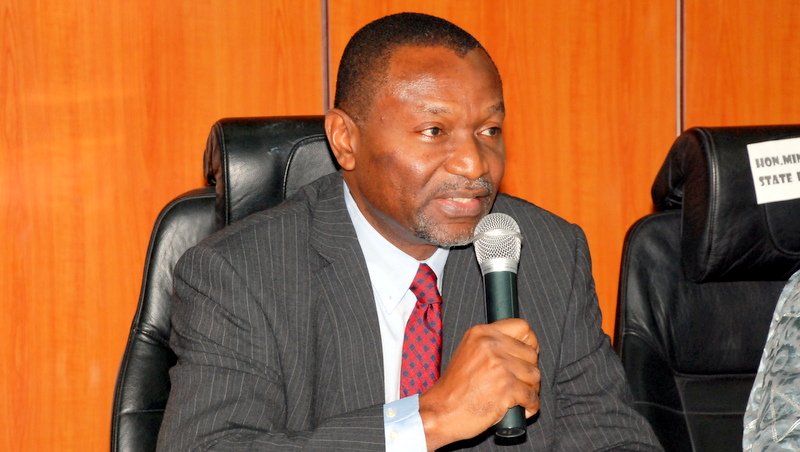The major focus of the Muhammadu Buhari administration is to provide a prosperous economy with the intention of creating maximum welfare for the people of the country.
The Minister of Budget and National Planning, Senator Udoma Udo Udoma, reiterated this on Monday at the opening of the 23rd Nigerian Economic Summit (NES#23) held in Abuja
This target, he said, was being pursued with efforts towards achieving a growth rate of 7 per cent by Year 2020.
He said with a further growth rate in the years to come, Nigeria was bound to be a regional industrial and commercial powerhouse.
His words: “Right from my university days I have been interested in development economics, particularly on the issue of why some countries are poor, and what is required for them to grow and become prosperous.
“Since the time of Adam Smith there have been thousands of publications on the issue and theories of development are legion. However, it is more than this. It sets out our comprehensive strategy for increasing our national productivity, and output, in order to achieve our objective of a prosperous economy providing maximum welfare for all our citizens.
“Our aim, simply put, is to achieve a growth rate of 7% by the year 2020, and thereafter, continue on a growth trajectory that could reach up to 10% in the succeeding years. If sustained, there is no reason why Nigeria cannot become a regional industrial and commercial powerhouse.”
The minister who exphasised the importance of the private sector in the bid to achieving a shift away from absolute reliance on oil as the means of revenue of the country said the Nigerian Economic Summit had provided a very useful platform for the public sector to engage with the private sector, development partners, academia, and Civil Society Organizations, to find ways of working together to achieve faster economic development.
He said unlike in the past, government had now accepted the private sector as partners in economic development.
“We no longer talk of the public sector having exclusive dominion of the commanding heights of the economy from which the private sector is excluded. Instead, Government has accepted that the private sector has an important and critical role to play, even in the area of providing key infrastructure such as roads, rail, and managing such critical infrastructure as airports, ports and petroleum refineries.
“Last year’s Summit was organized at a time the economy was in recession. To get out of recession required our refocusing the economy from reliance on crude oil to enhancing non-oil revenues, and the non-oil economy.
“In short, we had to quicken the process of changing from a mono-culture economy to a diversified, competitive economy, in which we grow what we eat and consume what we make. It was this focus on looking inwards that caused us to choose the theme “Made in Nigeria” for the 2016 Summit. And ensuring that more things are made in Nigeria continues to be the focus of this Government,” he said.
Udo Udoma also spoke on the efforts to ensure that the reason for the Economic Recovery Growth Plan, ERGP, was achieved.
He said the economic recovery programme was a product of extensive consultations and gave assurance that it would be well implemented despite the fear in some quarters.
“It is for this reason that this year’s Summit is dedicated to the implementation of the ERGP. We cannot, and must not, allow it to fail. At this Summit, we will be expecting the active participation of all the private sector persons gathered here in reviewing and strengthening our implementation strategies.
“Indeed, we are gathered here so as to give an opportunity for this gathering of captains of industry and influential members of the private sector to contribute towards the effective implementation of the ERGP.
“The focus of this year’s summit is therefore implementation and that is why the theme: “Opportunities, Productivity, and Employment: Actualizing the Economic Recovery and Growth Plan”, has been so selected. We must get things right this time.”
He said on the part of the government, it would ensure that the annual budgets were aligned with the ERGP so that government spending would be driven by the Plan.
He said the government had also set up a special implementation unit to ensure effective delivery of the Plan and has engaged staff to drive the process.
In the coming weeks, he pointed out, the government would be running sector-focused Malaysian style labs.
He said the labs were intended to bring all relevant stakeholders (whether in the public and private sectors) into weeks of intensive working sessions to brainstorm on practical steps to overcoming any identified challenges in the selected area.
The central objective of the labs, according to him, would be to bring in private capital to finance projects across the country.
“We will be inviting many of you to participate in these labs. Some of the staff we have already retained will be available in the course of the Summit to interact with you and give you more information on the proposed labs, as well as all our implementation initiatives,” he said.



